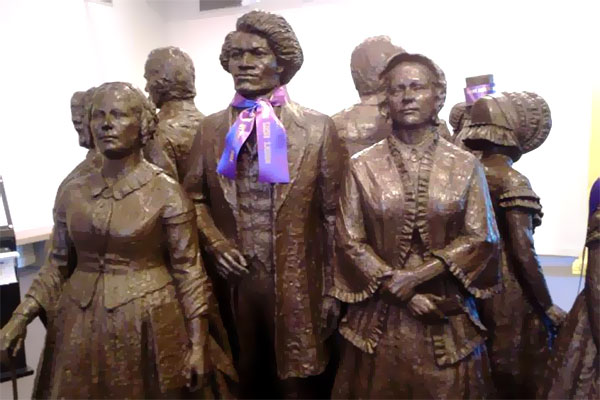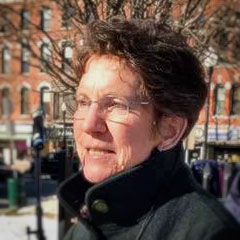
Frederick Douglass and Abolitionists, National Women’s Hall of Fame. Photo by Marguerite Sheehan.
This year on July 5th I stumbled into a place and a time out of time that caught my soul and will not let me go. The place was a local church. The occasion was a public choral reading of a speech by the abolitionist Frederick Douglass in Rochester New York July 5, 1852.
The spirit of Frederick Douglass was with us in his passionate words, in the life size painting of Douglass by local artist Louise Minks, and in the walls that wept as we sang My Country Tis of Thee. The pews were crowded with friends, neighbors, and strangers. It was a minor miracle that I found a seat in the front, where I was swept up into the past and my life resonated with his words.
I heard Douglass call on his mid-19th century listeners to bear the truth of racism and slavery and to own their need to crush that evil. Douglass reminded them — and now us — of the bravery of the revolutionary fathers, and he called on them to bring that bravery forth again to topple what he called the snake nursing on their own breasts: the breasts of the white pre-civil war population that benefited from the institution of slavery, just as White America still benefits from race hatred.
In his words: “I am not included within the pale of this glorious anniversary! This Fourth of July is yours, not mine. You may rejoice, I must mourn… Do you mean, citizens, to mock me, by asking me to speak today?”
Douglass has been invited by his fellow abolitionists to speak on July 5th against the tyranny of slavery. Was he speaking to them or in their stead, taking on what they could not voice? They wanted him to light the fire but he knew that the fire they hoped would be sparked was more contained and more discreet than the one that he carried deep in his bones and that he could not, would not, tamp down.
He said, “I fancy I hear some one of my audience say, it is just in this circumstance that you and your brother abolitionists fail to make a favorable impression on the public mind. Would you argue more, and denounce less, would you persuade more, and rebuke less, your cause would be much more likely to succeed.”
Frederick Douglass was speaking to a people who wanted an even-handed argument — a discussion about the failings of slavery on the occasion of the celebration of the birth of the nation. He would have none of it. He said loud and clearly “At a time like this, scorching irony, not convincing argument, is needed. O! Had I the ability, and could I reach the nation’s ear, I would, to day, pour out a fiery stream of biting ridicule, blasting reproach, withering sarcasm, and stern rebuke… The feeling of the nation must be quickened; the conscience of the nation must be roused; the propriety of the nation must be startled; the hypocrisy of the nation must be exposed; and its crimes against God and man must be proclaimed and denounced.”
This was the moment when time and space collapsed for me. As Frederick Douglass delivered the burden of his anguish and rage, I heard my own when called upon by the Church, by my community, by God, and by my own life to speak — not about race but about the scourge of homophobia. How often I have wanted to respond to those who casually or thoughtfully, with trepidation or idle curiosity, ask me to talk about how my queer, gay, lesbian, transgender brothers and sisters, never mind myself and my wife, conduct our lives (or as is often said, “our life style”), as if our very being could even be held up as an object of discussion. Like Douglas, I have wondered, “Do you mean, citizens, to mock me, by asking me to speak today?”
I must trust that no mockery is intended in these situations. When I am asked to speak, as I was asked last month to speak at the Pride Walk, and when I am asked to speak when my and other churches “consider” whether to engage in anti-homophobia training, I and any other LGBTQ person requested to speak are not being mocked. We are being asked to speak, as Frederick Douglass was asked to speak, because our lives demand a witness and who but we who stand here suffering can bring these crimes home to be “proclaimed and denounced?”
Oh if I had the ability and could I reach the Church and the nation’s ear, I would quicken the soul and the conscience so that hypocrisy would be exposed and propriety would be startled and we would be seen to be exactly for who we are: the most beautiful and loved children of a God who so loved us and made us, not to be dissected and not to be denied, but to be free. “Whoever has ears, listen.”
 About Marguerite Sheehan
About Marguerite Sheehan
Rev. Marguerite Sheehan is a United Church of Christ pastor presently serving Trinity Church, an ecumenical church in Shelburne Falls MA. She blogs at reverendmarguerite.wordpress.com and also writes a pastoral column for the Shelburne Falls West County Independent newspaper. She is a pastor, preacher, wife, lesbian feminist, mother, friend and grandmother.